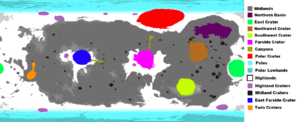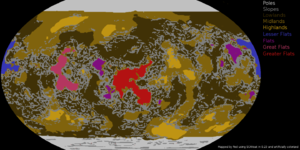Difference between revisions of "Biome"
m (Naming all maps "Biome Map of ____") |
m (Put list and map in section; shortening map title to "____ Biome Map") |
||
| Line 31: | Line 31: | ||
There is no atmosphere on the Mun but some experiments can be done at various flight altitudes. | There is no atmosphere on the Mun but some experiments can be done at various flight altitudes. | ||
| − | [[File:MunBiomeMap.png|thumb|Biome Map | + | ====Mun Biome List==== |
| + | [[File:MunBiomeMap.png|thumb|Mun Biome Map]] | ||
* Northern Basin | * Northern Basin | ||
* Highland Craters | * Highland Craters | ||
Revision as of 23:26, 8 March 2014
In KSP terminology, a biome is geographically contiguous area on the surface of a celestial body. They yield different experimental data (and flavor text). Currently[outdated], only the Kerbin System, consisting of Kerbin and its moon Mün and Minmus, have biomes. Taking data at different altitudes (including 'on the ground', i.e. surface samples) over different biomes reveals different scientific results.
In real life, biomes are contiguous areas with similar climatic conditions and organism communities. Without organisms, there are no biomes.
Contents
Biomes on the celestial bodies
If a body has specific biomes for the poles, the scientific results for both poles are the same. For example the north and south polar caps of Kerbin are the same biome called Ice Caps. Although officially only Kerbin, Mun and Minmus have biomes, there are two different biomes available on Laythe and Eve because part of their surface is covered by fluids which represent another biome.
Kerbin
The planet Kerbin has 9 true biomes which extend into airborne and orbital altitudes. It also has three surface-only biome special locations, all of which are at KSC (while in flight, KSC counts as Shores biome).
There is also a distinction between being on land in a biome or in water. Most rivers and smaller bodies of water are the same biome as the ground around them. Only large lakes and Kerbin's oceans are counted as Water biome areas. Shores make up medium-sized lakes and coastal areas, covering both beach areas and on out into the water. Interestingly, small islands in Kerbin's oceanic areas, such as at the Insular Airfield, sometimes are counted as surface landings, not splashdowns, within the Water biome.
Science can be done in landed and splashed situations within biomes where bodies of water can be found. Science can also be done in biomes at various altitudes. Note that there are differences in in-flight biome recognition between Crew Reports, EVAs, and the various Science modules. Also, some modules can't log results while flying.
- LaunchPad
- Runway
- KSC
- Grasslands
- Highlands
- Mountains
- Deserts
- Badlands
- Tundra
- IceCaps
- Water
- Shores
Mun
The Mun has in total 15 biomes, 7 of which are large-scale major craters with specific names. Most of the surface area belongs to the Midlands biome followed by the Highlands. Canyon biomes extend off a few major craters.
There is no atmosphere on the Mun but some experiments can be done at various flight altitudes.
Mun Biome List
- Northern Basin
- Highland Craters
- Highlands
- Midland Craters
- Midlands
- Canyons
- East Crater
- East Farside Crater
- Farside Crater
- Northwest Crater
- Southwest Crater
- Twin Craters
- Polar Crater
- Polar Lowlands
- Poles
Minmus
Minmus has in total 9 biomes. Unlike the Mun, none denote specific craters or other localized landmarks. The most distinctive quality of Minmus's biomes is the variety of Flats.
Minmus has no atmosphere but certain experiments can be performed at various flight altitudes.
- Highland
- Midlands
- Lowlands
- Slopes
- Lesser Flats
- Flats
- Great Flats
- Greater Flats
- Poles
Eve
- Ocean
- Land
Laythe
- Water
- Land
Other
All other celestial bodies have only one biome for the complete body. This will most likely change in the future.


